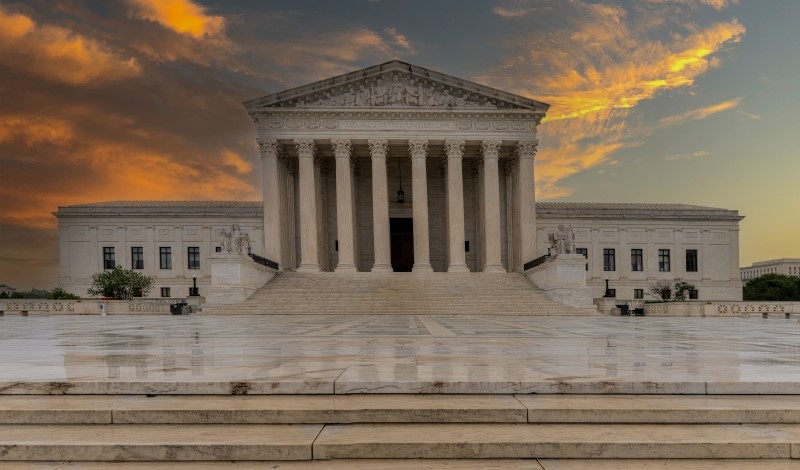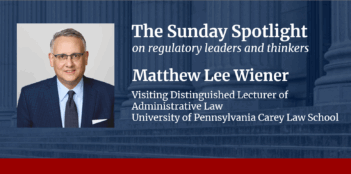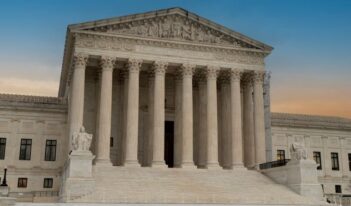
Scholars and practitioners assess the Court’s most significant regulatory decisions of its recently concluded term.
The U.S. Supreme Court ended its 2023-2024 term by releasing decisions with the potential to reshape the administrative state and reallocate power between the branches of government.
The Court not only clarified the law but in some cases rewrote it, overruling or abandoning precedent upon which thousands of lower court decisions had relied—including the landmark 1984 decision of Chevron v. Natural Resources Defense Council.
The Court also ruled on some of the most salient issues in American politics today, including former President Donald J. Trump’s eligibility for the 2024 election and the scope of presidential immunity from criminal prosecution. Additional rulings addressed significant policy issues involving abortion access, gun control, free speech, and the rights of workers and homeless individuals.
The Court’s administrative law decisions touched on key facets of agencies’ authority, including their funding structures, their responses to public comments, and their ability to enforce the statutes they administer.
The 2023-2024 term may have also been notable in that it was the first during which the Court adopted an ethics code. This did not stop a member of Congress, however, from introducing articles of impeachment against Justices Samuel Alito and Clarence Thomas following the conclusion of the Court’s 2023-2024 term. No justice of the Supreme Court has been impeached in over 200 years.
For the tenth year in a row, The Regulatory Review is publishing its annual series of essays reflecting on the Court’s major regulatory decisions from the preceding term. We have invited leading lawyers and scholars with a diverse range of backgrounds to analyze the legal issues surrounding the Court’s most prominent cases and provide insight into the recent term’s impact on law, regulation, and legal rights.
The contributors to this series are: Alia Al-Khatib, University of Pennsylvania Carey Law School; Bob Barr, former U.S. Representative for Georgia’s Seventh District; Miriam Becker-Cohen, Constitutional Accountability Center; Thomas A. Berry, Cato Institute; Cary Coglianese, University of Pennsylvania Carey Law School; Laura Dolbow, University of Colorado Boulder Law School; Elizabeth Elia, University of New Mexico School of Law; Daniel A. Farber, University of California, Berkeley, School of Law; Brian R. Frazelle, Constitutional Accountability Center; John M. Golden, University of Texas at Austin School of Law; Michael Z. Green, Texas A&M University School of Law; Justin (Gus) Hurwitz, University of Pennsylvania Carey Law School; Nazune Menka, Seattle University School of Law; Alan B. Morrison, George Washington University School of Law; Susan C. Morse, University of Texas at Austin School of Law; Eric W. Orts, The Wharton School, University of Pennsylvania; Richard J. Pierce, Jr., George Washington University School of Law; Zachary S. Price, University of California College of the Law, San Francisco; Peter M. Shane, New York University School of Law; Kate Shaw, University of Pennsylvania Carey Law School; Dru Stevenson, South Texas College of Law Houston; Amy Swearer, The Heritage Foundation; Andrew Willinger, Duke University School of Law; and Matthew Lee Wiener, University of Pennsylvania Carey Law School.
Two Neglected Effects of Loper Bright
July 1, 2024 | Richard J. Pierce, Jr., The George Washington University Law School
The Supreme Court’s decision to overturn Chevron may have two salutary effects on administrative law.
The King (Presumptively) May Do No Wrong
July 8, 2024 | Peter M. Shane, New York University School of Law
In Trump v. United States, the Supreme Court has expanded executive power and elevated the President above the law.
The Supreme Court as Enabler in Chief
July 8, 2024 | Eric W. Orts, The Wharton School, University of Pennsylvania
The Supreme Court’s recent decision on presidential immunity threatens the survival of the American Republic.
Why the Court’s CFPB Decision Is Correct and Important
July 15, 2024 | Zachary S. Price, University of California College of the Law, San Francisco
The Supreme Court upholds the funding structure of the Consumer Financial Protection Bureau.
Lowering the Bar for Employees with Title VII Discrimination Claims
July 16, 2024 | Alia Al-Khatib, University of Pennsylvania Carey Law School
Employees need not show “significant” harm to sustain discrimination claims.
Access Barriers Remain After Abortion Pill Decision
July 17, 2024 | Laura Dolbow, University of Colorado Boulder Law School
The Court rejected a challenge to FDA approval of mifepristone, but other obstacles could still impede access.
Legislative Exactions
July 18, 2024 | Elizabeth Elia, University of New Mexico School of Law
The Court unanimously agrees that the Nollan/Dolan test applies to administrative and legislative exactions.
An Elephant Giving Birth to a Mouse
July 22, 2024 | Daniel A. Farber, University of California, Berkeley
The Court stayed the “good neighbor” provision of the Clean Air Act in Ohio v. Environmental Protection Agency.
A Unanimous Court Sides with the NRA in Free Speech Case
July 22, 2024 | Dru Stevenson, South Texas College of Law Houston
The Court condemned regulator pressure to cut ties with the gun industry to mitigate financial risk.
Bissonnette and the Future of Federal Arbitration
July 23, 2024 | Miriam Becker-Cohen, Constitutional Accountability Center
The Court delivers a victory for truck-drivers and other transportation workers.
The Court Reaffirms that Agencies Cannot Rewrite Laws
July 24, 2024 | Bob Barr, Former U.S. Representative for Georgia’s Seventh District
New limits on ATF’s ability to expand statutory scope by redefining key terms may have broader implications.
After Cargill, ATF’s Legal Woes are Likely to Continue
July 24, 2024 | Amy Swearer, The Heritage Foundation
A recent Supreme Court decision impacts ATF’s efforts to redefine gun regulations.
Cargill and the Regulatory Time Gap
July 24, 2024 | Andrew Willinger, Duke University School of Law
The time elapsed since the passage of an authorizing statute may influence how the Court views new regulations.
Financial Self-Determination for Native Nations
July 25, 2024 | Nazune Menka, Seattle University School of Law
A Supreme Court decision enhances Native Nations’ self-determination by requiring the federal government to reimburse certain healthcare costs.
What Is Left of Agency Adjudication After Jarkesy?
July 29, 2024 | Matthew Lee Wiener, University of Pennsylvania Carey Law School
A Supreme Court decision seemingly limited to securities fraud could imperil regulatory adjudication across the federal government.
SEC Adjudication of Securities Fraud Held Unconstitutional
July 30, 2024 | John M. Golden, University of Texas School of Law
The Court rules that the Seventh Amendment applies to some SEC enforcement actions, but questions remain.
Corner Post Broadens Loper Bright, But Footnote 8 Offers a Limit
July 30, 2024 | Susan C. Morse, University of Texas School of Law
The Court opens up agencies to claims of exceeding statutory authority, with a possible constraint.
Supreme Court Needlessly Expands U.S. Statute of Limitations
July 30, 2024 | Alan B. Morrison, George Washington University School of Law
In Corner Post v. Board of Governors, the Court renders agency rules more vulnerable to challenge.
Supreme Court Allows Cities to Punish Homelessness
July 31, 2024 | Brian Frazelle, Constitutional Accountability Center
A new decision takes a narrow view of the Cruel and Unusual Punishments Clause.
What the Starbucks Decision Means for the NLRB
August 1, 2024 | Michael Z. Green, Texas A&M University School of Law
An overlooked Supreme Court decision may give courts more discretion to second-guess the NLRB.
The End of the Chevron Era
August 5, 2024 | Thomas A. Berry, Cato Institute
The Administrative Procedure Act empowers courts—not agencies—to decide a statute’s single best meaning.
After Murthy v. Missouri, Diffuse Jawboning Remains Murky
August 6, 2024 | Gus Hurwitz, University of Pennsylvania Carey Law School
The Court acknowledges governments’ increasing interests in regulating online speech but provides little guidance.
The Imperial Supreme Court
August 7, 2024 | Kate Shaw, University of Pennsylvania Carey Law School
Loper Bright significantly expands the power of the Supreme Court at the expense of democratic institutions of government.
A Legal Earthquake
August 8, 2024 | Cary Coglianese, University of Pennsylvania Carey Law School
With several key decisions this term, the Supreme Court has shaken up prevailing governing doctrines and produced substantial legal uncertainty.



